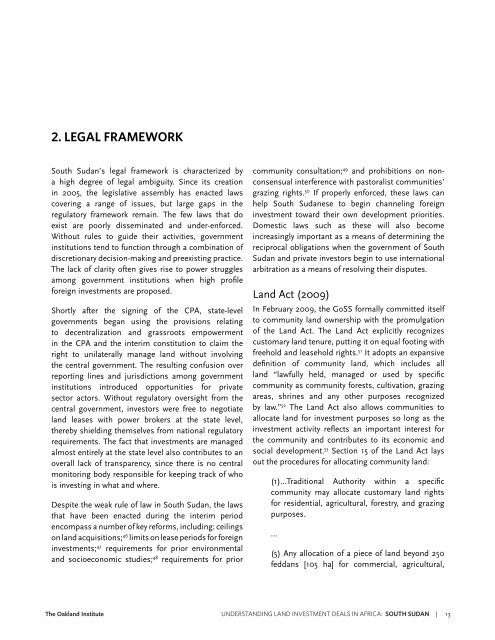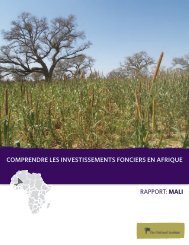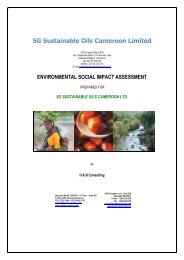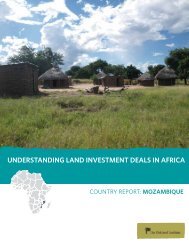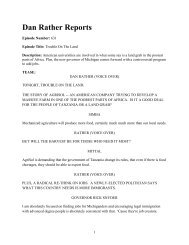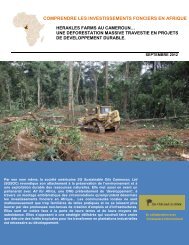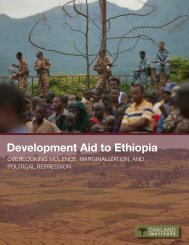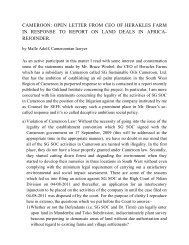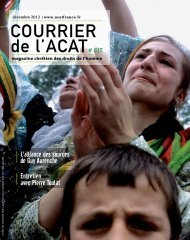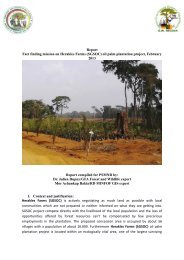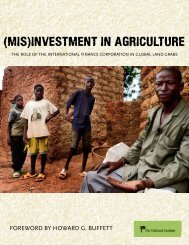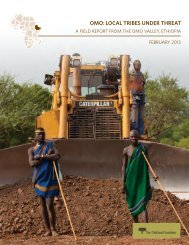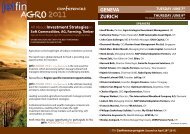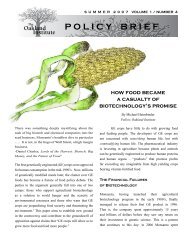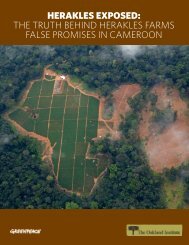understanding land investment deals in africa - Oakland Institute
understanding land investment deals in africa - Oakland Institute
understanding land investment deals in africa - Oakland Institute
- No tags were found...
You also want an ePaper? Increase the reach of your titles
YUMPU automatically turns print PDFs into web optimized ePapers that Google loves.
2. LEGAL FRAMEWORKSouth Sudan’s legal framework is characterized bya high degree of legal ambiguity. S<strong>in</strong>ce its creation<strong>in</strong> 2005, the legislative assembly has enacted lawscover<strong>in</strong>g a range of issues, but large gaps <strong>in</strong> theregulatory framework rema<strong>in</strong>. The few laws that doexist are poorly dissem<strong>in</strong>ated and under-enforced.Without rules to guide their activities, government<strong>in</strong>stitutions tend to function through a comb<strong>in</strong>ation ofdiscretionary decision-mak<strong>in</strong>g and preexist<strong>in</strong>g practice.The lack of clarity often gives rise to power strugglesamong government <strong>in</strong>stitutions when high profileforeign <strong><strong>in</strong>vestment</strong>s are proposed.Shortly after the sign<strong>in</strong>g of the CPA, state-levelgovernments began us<strong>in</strong>g the provisions relat<strong>in</strong>gto decentralization and grassroots empowerment<strong>in</strong> the CPA and the <strong>in</strong>terim constitution to claim theright to unilaterally manage <strong>land</strong> without <strong>in</strong>volv<strong>in</strong>gthe central government. The result<strong>in</strong>g confusion overreport<strong>in</strong>g l<strong>in</strong>es and jurisdictions among government<strong>in</strong>stitutions <strong>in</strong>troduced opportunities for privatesector actors. Without regulatory oversight from thecentral government, <strong>in</strong>vestors were free to negotiate<strong>land</strong> leases with power brokers at the state level,thereby shield<strong>in</strong>g themselves from national regulatoryrequirements. The fact that <strong><strong>in</strong>vestment</strong>s are managedalmost entirely at the state level also contributes to anoverall lack of transparency, s<strong>in</strong>ce there is no centralmonitor<strong>in</strong>g body responsible for keep<strong>in</strong>g track of whois <strong>in</strong>vest<strong>in</strong>g <strong>in</strong> what and where.Despite the weak rule of law <strong>in</strong> South Sudan, the lawsthat have been enacted dur<strong>in</strong>g the <strong>in</strong>terim periodencompass a number of key reforms, <strong>in</strong>clud<strong>in</strong>g: ceil<strong>in</strong>gson <strong>land</strong> acquisitions; 46 limits on lease periods for foreign<strong><strong>in</strong>vestment</strong>s; 47 requirements for prior environmenta<strong>land</strong> socioeconomic studies; 48 requirements for priorcommunity consultation; 49 and prohibitions on nonconsensual<strong>in</strong>terference with pastoralist communities’graz<strong>in</strong>g rights. 50 If properly enforced, these laws canhelp South Sudanese to beg<strong>in</strong> channel<strong>in</strong>g foreign<strong><strong>in</strong>vestment</strong> toward their own development priorities.Domestic laws such as these will also become<strong>in</strong>creas<strong>in</strong>gly important as a means of determ<strong>in</strong><strong>in</strong>g thereciprocal obligations when the government of SouthSudan and private <strong>in</strong>vestors beg<strong>in</strong> to use <strong>in</strong>ternationalarbitration as a means of resolv<strong>in</strong>g their disputes.Land Act (2009)In February 2009, the GoSS formally committed itselfto community <strong>land</strong> ownership with the promulgationof the Land Act. The Land Act explicitly recognizescustomary <strong>land</strong> tenure, putt<strong>in</strong>g it on equal foot<strong>in</strong>g withfreehold and leasehold rights. 51 It adopts an expansivedef<strong>in</strong>ition of community <strong>land</strong>, which <strong>in</strong>cludes all<strong>land</strong> “lawfully held, managed or used by specificcommunity as community forests, cultivation, graz<strong>in</strong>gareas, shr<strong>in</strong>es and any other purposes recognizedby law.” 52 The Land Act also allows communities toallocate <strong>land</strong> for <strong><strong>in</strong>vestment</strong> purposes so long as the<strong><strong>in</strong>vestment</strong> activity reflects an important <strong>in</strong>terest forthe community and contributes to its economic andsocial development. 53 Section 15 of the Land Act laysout the procedures for allocat<strong>in</strong>g community <strong>land</strong>:(1)…Traditional Authority with<strong>in</strong> a specificcommunity may allocate customary <strong>land</strong> rightsfor residential, agricultural, forestry, and graz<strong>in</strong>gpurposes.…(5) Any allocation of a piece of <strong>land</strong> beyond 250feddans [105 ha] for commercial, agricultural,The Oak<strong>land</strong> <strong>Institute</strong> <strong>understand<strong>in</strong>g</strong> <strong>land</strong> <strong><strong>in</strong>vestment</strong> <strong>deals</strong> <strong>in</strong> <strong>africa</strong>: south sudan | 13


